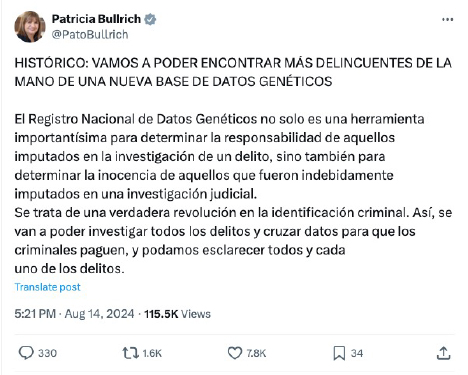The Chamber of Deputies approved a bill that establishes the expansion of the National Registry of Genetic Data linked to Crimes against Sexual Integrity (RNDG), with the aim of collaborating in the genetic identification of all types of criminal investigation. The purpose of this reform is to add new attributions to the organism created in 2013, so that it is not exclusively dedicated to sex offenders.
The proposal was approved yesterday with 146 affirmative votes, 87 negative votes and 7 abstentions, this initiative is also promoted by the National Government. It is expected that, if it is finally approved by the Senate, the new data bank will make it possible to compare the genetic fingerprints obtained at the scene of the crime with the genetic profile of the accused and convicted persons.
“There is absolute agreement that this law must be modified, the Registry must be expanded, and contact DNA must be incorporated so that new profiles can be added,” defended Laura Machado (PRO), president of the Criminal Legislation Committee, during the debate.
The project proposes not only to facilitate the progress of legal cases for crimes, but also to “identify and help determine the whereabouts of lost, missing or deceased persons”. The use of the information must comply with the criteria of the regulations on Personal Data Protection. The information will have the character of sensitive, reserved data, and will only be provided to judicial authorities or the Public Prosecutor’s Office, within the framework of a legal case.
Security Minister Patricia Bullrich welcomed the decision of the Chamber of Deputies,

“HISTORICAL: WE ARE GOING TO BE ABLE TO FIND MORE CRIMINALS HAND IN HAND WITH A NEW GENETIC DATABASE.
The National Registry of Genetic Data is not only a very important tool to determine the responsibility of those accused in the investigation of a crime, but also to determine the innocence of those who were unduly charged in a judicial investigation. It is a true revolution in criminal identification. Thus, we will be able to investigate all crimes and cross-reference data so that criminals pay, and we can clarify each and every crime.”
Bullrich wrote in his account of X



 EL SALVADOR
EL SALVADOR HONDURAS
HONDURAS

 BOLIVIA
BOLIVIA PERU
PERU